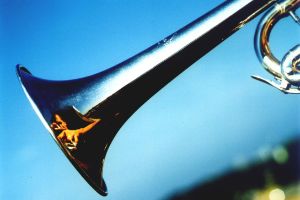silent green 1
Mazen Kerbaj // Ty Bouque // Marco Blaauw / Global Breath 1

The bell of a trumpet, in whose glow Marco Blaauw is reflected © José Verhaegh
This evening at silent green opens with the world premiere of Mazen Kerbaj’s new work “Lungless”, which reworks the composer’s painful childhood memories of the Lebanese civil war in sonic form: “The title ‘Lungless’ should be understood both literally (the sound is generated by an air compressor) and figuratively (the inability to speak in the face of war’s violence).” This is followed by a solo concert from baritone Ty Bouque, which navigates the boundaries between the audible and the inaudible, the communicable and the private, the vocal and the muscular through works that include a study of the voice by Evan Johnson. Bouque’s relationship to sound is explicitly queer, luminous and introspective, barren and vulnerable. The programme is completed by a concert by the research project Global Breath, initiated by Marco Blaauw, for which the musician has explored the meaning of a trumpet sound in different cultural contexts around the world since 2016. Numerous new works have emerged from this research; the compositions by Ayanna Witter-Johnson, Elena Rykova, George Lewis and Aaron Holloway-Nahum offer some initial glimpses.
Programme
Mazen Kerbaj
With a Little Help From My Friends I: Lungless
for Putin’s Organ (2025)
Commissioned by Maerz Musik
World premiere
With
Mazen Kerbaj – Putin’s Organ
Ty Bouque: Seated at the Throat
Georges Aperghis
Quatorze Jactations (selection)
for solo voice (2001)
Evan Johnson
A general interrupter to ongoing activity
for solo voice (2011)
Timothy McCormack
Seated at the Throat
for solo voice (2024)
dedicated to Ty Bouque
German premiere
With
Ty Bouque – voice
Global Breath 1
Elena Rykova
Vicissitudes
for double bell trumpet and electronics (2023)
Commissioned by Marco Blaauw, sponsored by Musikfonds e.V. and Kunststiftung NRW
Ayanna Witter-Johnson
Songs of the Abeng
for 2 trumpets and electronics (2025)
Commissioned by Marco Blaauw, sponsored by Musikfonds e.V. and Kunststiftung NRW
World premiere
George Lewis
Buzzing
for trumpet and live electronics (2024)
Commissioned by Marco Blaauw, sponsored by Musikfonds e.V. and Kunststiftung NRW
Aaron Holloway-Nahum
I Contemplate Snippets of Silence and Find them Few
for double bell trumpet, baritone and electronics (2023)
Commissioned by SWR
With
Marco Blaauw – double bell trumpet
Laura Vukobratović – offstage trumpet
Aaron Holloway-Nahum – electronics
Ty Bouque – baritone
Global Breath is supported by Ernst von Siemens Music Foundation, Musikfonds Neustart Kultur and Kunststiftung NRW.
 |  |